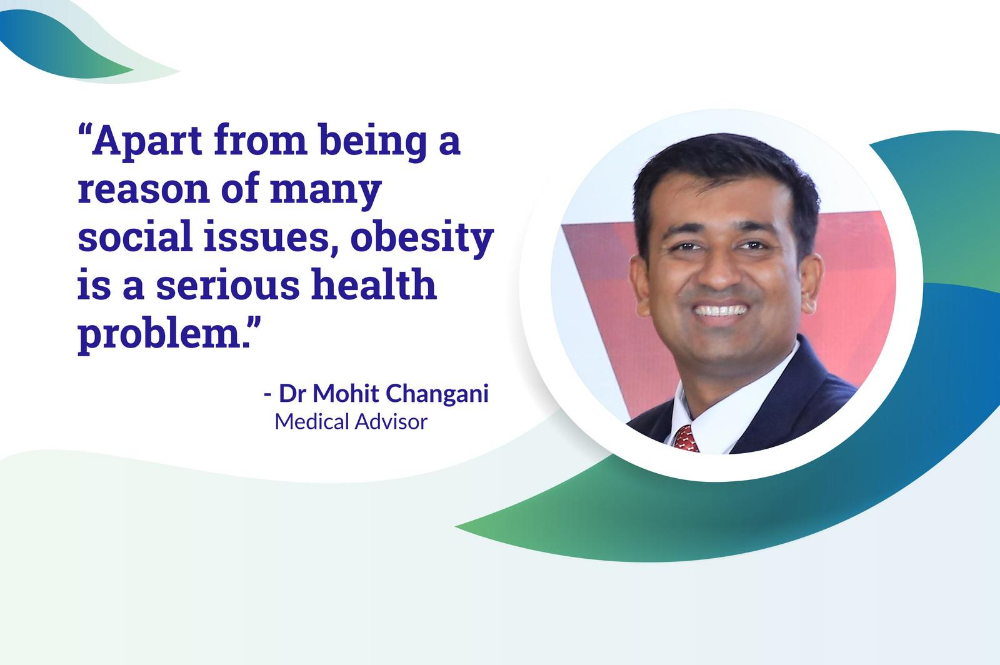

Diet, Fitness, Weight loss, BMI- learn about obesity, the growing epidemic of healthcare!
29th Jul, 2020
Weight loss and fitness are some words that one often hears in their lifetime. Be it to achieve that fab body or to be able to run a 5k marathon, we have often looked very lightly at these terms. But fitness is not just a term in vogue, it is the need of the hour. Obesity or being overweight is not just a cosmetic concern or an issue of self-confidence, but a serious medical problem that makes you more prone to multiple diseases, some of which are life-threatening. Being overweight leads to the high body fat to muscle ratio that strains your bones and your internal organs leading to heart disease, diabetes, hypertension, liver disease, dyslipidemia, reproductive disorders, mood disorders and even some cancers.[1]
21st century India finds itself afflicted by lifestyle diseases, and obesity lies at the root of these diseases. No longer just a rich person’s disease, Obesity is now an epidemic in India and affects millions. In Gujarat alone, over 15% of the population is obese. In Andhra Pradesh, Andaman & Nicobar Islands and Sikkim, 30% of the population is obese.[2] With the burden of the disease fast increasing, being overweight is fast becoming a serious burden on healthcare, we ask Dr Mohit Changani, medical advisor in Cadila Pharmaceuticals about Obesity.
“Obesity is essentially the accumulation of body fat, usually caused by the consumption of more calories than the requirement of the body in terms of daily physical as well as basal activities. The excess calories are then stored as fat in the adipose tissues. Genetic factors can also be a contributor to obesity.
Unhealthy lifestyle habits are the leading cause of being overweight or obese. Lifestyle habits include food and exercise habits, stress levels, sleep patterns and metabolism. Commonly, excessive consumption of fried and fatty food, processed, fatty meats, dairy products, foods with added sugar (such as baked goods and cookies) & hidden sugar (packaged foods and snacks) and beverages propel you to being overweight. A sedentary lifestyle, where physical activity is limited, also leads to obesity. However, certain endocrine disorders such as diabetes and PCOS can also cause obesity.
Obesity leads to a diminished quality of life. Being overweight or obese has been linked to emotional disturbances, depression, shame and guilt, and even discrimination from others. Weight-related issues can also lead to sexual problems, social isolation, lower work achievement and more.
It is easy to identify whether you are obese and need help. A tool commonly used to diagnose obesity is the Body Mass Index (BMI). A person’s BMI is essentially a rough calculation of your weight in relation to your height i.e.
BMI = Weight in kg/ (height in m)2
For adults, a BMI greater than 25 indicates that they are overweight, and a BMI greater than 30 indicates that they are obese. BMI indicators are the same for both sexes and all ages of adults.
Your doctor might also run some other tests to help diagnose obesity such as blood tests to check cholesterol and sugar levels, thyroid tests, liver function tests and more.
While obesity can take over one’s life, one can tackle obesity by making a few lifestyle changes. The goal is not only to achieve weight loss but to attain fitness and to reach and maintain a healthy weight. Though how to lose weight is a question everyone asks, we should always aim to follow a healthy weight loss regime.
1. Dietary Changes
Regularization of food patterns is the cornerstone of a healthy diet schedule. One should avoid untimely food intake. Small but frequent meals are advocated to keep your overeating in check. Keeping yourself away from junk food, processed and fatty foods, food with high sugar content will help. There should be an inclination toward consuming foods with high fibre content such as whole grains, fruits and green leafy vegetables which will keep your calorie intake limited.
2. Identify triggers and traps that cause you to over-eat
Observe yourself and identify situations that cause out-of-control eating. Once you observe yourself, you will see a pattern emerging. Formulate a strategy to handle these situations and stay in control of your eating habits.
3. Increase Physical Activity
Along with dietary changes, an increase in physical activity is also essential to the weight loss process. A regular walk of 30 – 60 minutes or other exercises like cardio, brisk walking, jogging or aerobic exercise for 4-5 days per week will help you stay active.
4. Other Lifestyle Changes
An examination of other aspects of your lifestyle such as your food habits, stress levels and sleeping patterns and trying to find a healthy balance will also help you to identify the problem areas.
Obesity with itself brings a lot of social and self-confidence problems. But keeping that aside, the biggest concern is that of health. While the above actions are the first step of action to reduce weight, some doctors might also prescribe medical or surgical removal of fat, or prescribe weight loss medications depending on the stage of the obesity you currently are in. The important thing to remember is to take care of yourself and aim to lead a healthier life.”
Read more stories:
References:
[1]: https://www.mayoclinic.org/diseases-conditions/obesity/symptoms-causes/syc-20375742
[2]:https://www.jcdr.net/articles/PDF/12201/37014_CE%5BRa1%5D_F(SL)_PF1(MJ_AP)_PFA(MJ_AP)_PN(SHU).pdf

